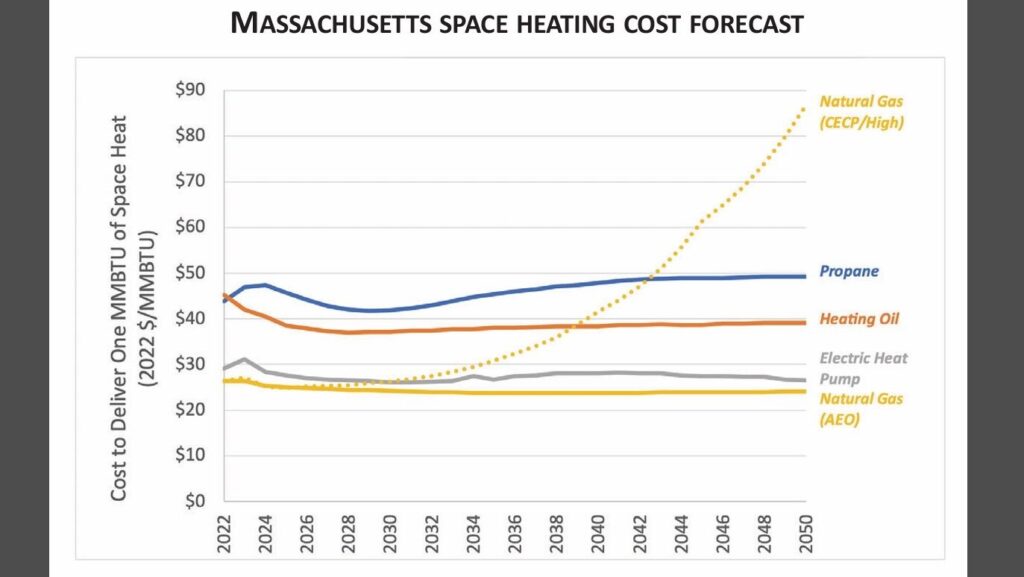HeatPump
Heat pump Google Commons photo
The City Council’s Zoning and Planning Committee is working on a potential ordinance to require buildings to report energy use and reduce greenhouse gas emissions.
Known as a BERDO (Building Emissions Reduction and Disclosure Ordinance), the plan would include commercial (and possibly residential) buildings with more than 20,000 square feet of floor space.
The BERDO would cover between 23 percent and 28 percent of the buildings in Newton.
Boston has a BERDO in place already. So does Cambridge. And municipalities across the nation are drafting similar ordinances and bylaws.
While climate change is largely exacerbated by vehicles and transportation, it’s estimated that about a third of the state’s carbon emissions come from buildings.
Cost of compliance
But a BERDO comes with expenses—for developers, costs for homeowners and costs for taxpayers—and the city is looking at ways to alleviate some of those costs.
“Today we see that heating with heat pumps can be slightly more expensive than heating with natural gas, though less expensive than heating with fuel oil,” Phillip Gates, associate with Synapse Energy Economics, said in a presentation on the proposal to the Zoning and Planning Committee Monday.
But studies have determined, Gates added, that by the year 2030 that reality will flip, and heat pumps will be cheaper to heat with than natural gas, as the fixed cost of gas is spread out over fewer and fewer units and rates increase.
“Costs will only rise for natural gas beyond that,” he said. “Specifically, they will rise to 300 to 700 percent of current costs by the year 2050.”
When it comes to construction, capital costs of BERDO compliance vary based on building type and size, Gates continued.
“Broadly, they fall within a one-time investment or a phased investment that, in total, would equal between $5 and $35 per square foot,” he said. “If we amortize those costs over the useful life of the equipment at 20 years and 6 percent interest, we see that those costs range from 40 cents to $3 per square foot annually.”
What does that mean for occupants of these BERDO-converted properties? Gates said his firm estimates a BERDO in Newton would drive up rent prices by 4 percent for both residential and commercial properties.
“This is a one-time increase that is comparable to typical rent increases that tenants see in a normal year,” Gates said.
There will be costs to the city as well, to the tune of up to $290,000, Gates said. That amount includes annual consulting and one full-time staff member to administer the BERDO program.
A BERDO would likely increase property values, Gates said, which could mean more money to the city.
“The average sale price increases between 2 and 25 percent for commercial buildings that are ‘high-performing,’ meaning Energy Star-labeled, which would be at the 75th percentile for performance,” he said.

Some financial help
Rents are already high, and inflation has hiked the cost of building anything.
Fortunately, there are ways to help with BERDO costs.
Mass Save—an organization comprised of electric and gas utility providers aimed at reducing clean energy costs—has rebate programs to help pay the cost of commercial and residential energy conversion.
Mass Save incentives can amount to between $9 and $15 per square foot for commercial buildings, Gates noted. And Mass Save also has incentive rebates for heat pumps and water heaters.
There’s a federal tax deduction for commercial and multifamily residential buildings, offering up to $6 per square foot for projects meeting certain criteria.
“So in total, there’s up to $20 per square foot, just from those two sources,” Gates said.
And there’s $70 million in seed funding for affordable housing from the Massachusetts Community Climate Bank, available through MassHousing.
There are also state programs and utility company initiatives that offer low-interest loans for energy conversion.
In his presentation, Gates used the Early Childhood Program building as an example. The HVAC system in that 42,000 square-foot facility was converted to clean energy in 2022. The project cost $1.57 million, or $37 per square foot. Installing a new traditional gas-heated HVAC system would have cost $2.2 million.
The BERDO discussion is expected to continue this fall before possibly being voted on and sent to the City Council as a whole.
You can watch the entire BERDO presentation here.